 Politics & Law
Politics & Law


|
| An overview of the 10th session of the 15th National Assembly. VNA/VNS Photo |
HÀ NỘI – The Supreme People’s Court has achieved higher rates of case resolution while navigating organisational reforms, Chief Justice Lê Minh Trí told the National Assembly at its tenth session on Monday.
Reporting on the performance of the Supreme People's Court during 2021–2026, he noted that amidst global volatility and domestic challenges, the court system has proved proactive, innovative, and creative, leading to measures for improving leadership capacity and meeting justice reform requirements.
Since July 1 this year, the sector has undergone a revolutionary restructuring under the Party Central Committee's guidelines, applying a three-tier system comprising the Supreme People's Court, provincial-level courts, and regional courts.
Trí highlighted that throughout the 15th parliamentary tenure, courts have received more than 2.75 million cases, with almost 2.69 million resolved, representing respective increases of some 317,470 cases and 310,120 cases as compared to the previous term, and exceeding the NA-set targets.
Criminal cases were handled with rigour and fairness, he said, adding more than 460,000 cases involving 867,550 defendants were settled, up nearly 75,440 cases and 222,040 defendants against the previous tenure, with no wrong convictions reported. A string of cases under the supervision of the Central Steering Committee for Prevention and Control of Corruption, Wastefulness and Negative Phenomena were processed, reinforcing public trust in the Party and State.
He also highlighted improvement in the handling of civil and administrative cases, both in volume and quality, with courts resolving more than 2 million civil cases and nearly 44,000 administrative cases. The number of rulings overturned or amended remains lower than the National Assembly’s ceiling targets.
Beyond case processing, the court system has strengthened Việt Nam's legal framework. The Supreme People's Court led the development of five laws and two resolutions passed by the parliament, along with five ordinances and 11 resolutions submitted to the NA Standing Committee for approval.
According to Trí, supervision and personnel work have been given strong attention. Regular inspections have helped correct shortcomings in judicial conduct and judges' performance. Following the system’s restructuring, the Chief Justice directed greater delegation of authority to regional courts and better resource allocation to ensure smooth adjudication and protect the rights and legitimate interests of citizens and enterprises.
He reported that international cooperation has been strengthened to learn from international partners, while administrative procedure reform and digital transformation have received due regard.
While acknowledging achievements, the Chief Justice noted persistent challenges, including rising caseloads, limited staffing, and infrastructure constraints following the reorganisation.
He said lessons learnt include associating the system's operations with the Party building and rectification, stepping up human resources training, enhancing discipline, reforming inspection, boosting institutional building, accelerating digital transformation, and fostering international cooperation. — VNA/VNS




